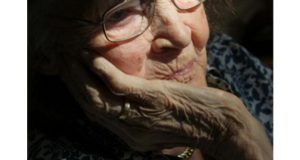
Scott Mitchell, the husband of Barbara Windsor, issued a call on Valentine’s Day for people to take NHS advice and check loved ones for signs for dementia.
The couple have spoken about the Ms Windsor’s battle with dementia in an effort to raise awareness about the condition.
Dame Barbara was diagnosed with dementia in 2014 and Mr Mitchell said detecting the condition early meant she could get the support she needed to keep working on Eastenders for another two years, before making her exit.
Mr Mitchell has urged people to follow NHS England’s advice to ‘check your mate’ for changes such as mood swings and depression, which could be the first indication that someone has dementia, and encourage them to get checked over by their GP.
He said: “It’s so important to catch the signs early enough to ensure that you, your family and your loved one receive the support available from the NHS and charities like Alzheimer’s Society, so they can face the challenges dementia creates.
“Having Barbara diagnosed early was a positive move and allowed us to adjust to her condition and, in my opinion, gave her an extra two years of being able to continue working and appearances in Eastenders which were normality to her and to live life as fully as possible.
“So for Valentine’s Day, I’m urging you all to support a loved one if they are acting out of character and if you’re worried, gently suggest they visit their GP and receive the care and support they deserve.”
Dementia workers are among the people being recruited to work with GPs as part of the NHS Long Term Plan, which will see an extra £4.5 billion ploughed into primary and community care.
As well as mood swings and depression, other signs to look out for include repeating questions, poor concentration, getting confused in new situations and not being able to use everyday gadgets and appliances such as the TV remote control.
Professor Alistair Burns, NHS England’s national clinical director for dementia and older people’s mental health, said: “As relationships progress over a number of years, loved ones can change and develop habits that we often put down to signs of ageing.
“Symptoms often develop very slowly so it is easy to regard them as being a normal part of getting older, but this is not always the case.
“Dementia is a condition that develops slowly and often goes unnoticed in people we know intimately. If you think your partner has been feeling down or is showing signs of confusion, gently and sensitively suggest that they see their GP.
“Getting a diagnosis – whether it is for depression or dementia – is the first step in accessing the best help and support.”
Dementia, which costs the country £26 billion a year, is a key priority for NHS England, which has set the target of making this the best country in the world for dementia care and support for individuals with dementia, their carers and families to live, as well as the best place in the world to undertake research into these conditions.
